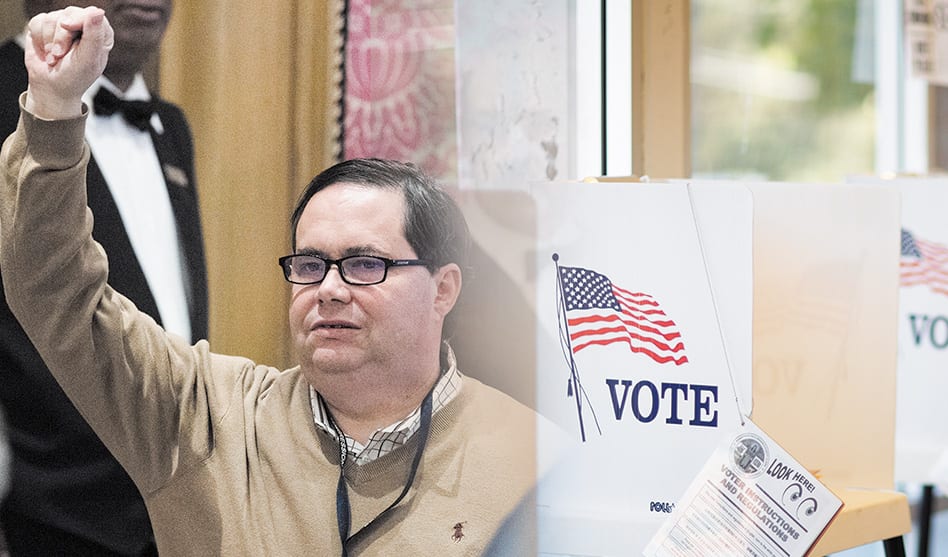Rep. Blake Farenthold, R-Texas, is seen during a dinner at the House and Senate Republican retreat on Jan. 31.
(Photo By Tom Williams/CQ Roll Call, via AP Images)
Deciding Farenthold’s replacement could be significant in which party controls Congress after November
DAVID TAFFET | Senior Staff Writer
taffet@dallasvoice.com
Gov. Greg Abbott earlier this month asked Attorney General Ken Paxton if Abbott could legally use his emergency powers to schedule an election to replace former U.S. Rep. Blake Farenthold, who resigned from office on April 11 after it was revealed he paid a settlement for sexual harassment charges with taxpayer money.
Farenthold, R-Corpus Christi, represented 13 South Texas counties covered by a disaster declaration as a result of Hurricane Harvey.
Special elections in Texas may be held only on uniform election days, and must be 36 to 50 days from the date the election is called. The only uniform date left is Nov. 6 — Election Day. In cases of emergency, the governor is authorized to order a special election before the uniform date.
“It is impossible to order an election, allow candidates to file, print ballots, mail them in accordance with federal law and hold an emergency election within the statutorily prescribed 50-day window,” Abbott wrote to Paxton in a letter asking for the attorney general to issue a legal opinion.
In addition, if there’s a run-off, a 70-day period between the primary and the election is required by state law.
“I am concerned that the combination of state and federal law makes it practically impossible to hold an emergency special election to replace [Farenthold] before the end of September,” Abbott wrote.
Under the Texas Disaster Act of 1975, the governor may “suspend certain statutory provisions if strict compliance with those provisions would in any way prevent, hinder or delay necessary action in coping with a disaster,” Abbott noted, asking Paxton to weigh in on whether he could suspend some of the rules in order to replace Farenthold as quickly as possible.
Paxton agreed this week, writing, “If the governor determines the situation in Congressional District 27 constitutes an emergency warranting a special election [before Nov. 6], a court would likely conclude that section 41.0011 of the Election Code authorizes calling an expedited special election to fill the vacancy in that district.”
Because Farenthold had already announced he wouldn’t seek re-election, both Democrats and Republicans have lined up to replace him. Two Republicans and two Democrats are in runoffs to represent their parties in the November election. To fill the seat earlier through the end of the current term, the primary and runoff process would probably include, but not be limited to, those four candidates.
Farenthold, a Tea Party caucus member, is the step-grandson of former state Rep. Sissy Farenthold, who ran for governor twice and whose name was placed in nomination for vice president at the Democratic National Convention in 1972.
Blake Farenthold first came to office in 2011 after defeating 14-term Democratic Rep. Solomon Ortiz by less than 1 percent of the vote. After his election, the district was gerrymandered to lean more heavily Republican, but not so heavily that the district couldn’t swing back.
The Republicans in the race are both running as fiscal conservatives at a time when Corpus Christi needs federal financial help to rebuild its port, severely damaged during Hurricane Harvey last August.
Stonewall Democrats of Dallas President Lee Daugherty said he believes a Democrat can win the race.
“I’m compassionate about the fact people affected by Hurricane Harvey need representation,” Daugherty said. “But emergency funds have already been set aside.”
He saw irony in the call for an emergency election from Republicans.
“These fiscal conservatives are proving to be anything but,” Daugherty said.
He pointed out that it would cost millions of dollars to hold an election that will give the district representation for just a few months at most.
“This throws a wrench into the entire democratic process,” he said. “Candidates would have to file by next week.”
Daugherty also said a special election would disadvantage Democrats, who usually gather signatures to enter the race.
Republicans pay a filing fee more often than collecting signatures. Despite that, Daugherty pointed out that Democrats have won most special elections since Trump’s election and believes the Democrat in this race has a chance to swing another seat to the blue column.


